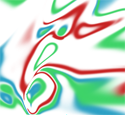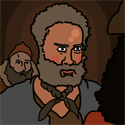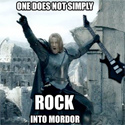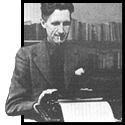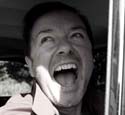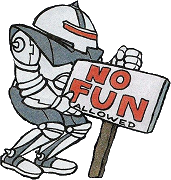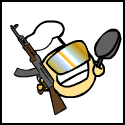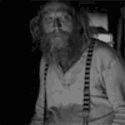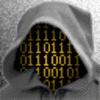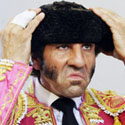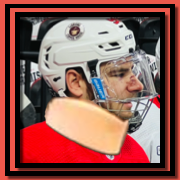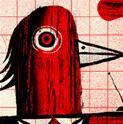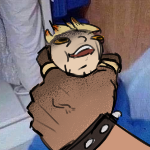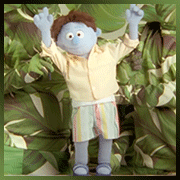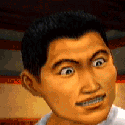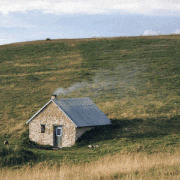|
I just gave up on The Defense by Nabokov. This is the first book of his that I've really disliked. It's not that it's a bad book(he wouldn't do that to me, he just wouldn't) it just is entirely about the most boring chess player. I don't want to give him advice but it should have been about something other than that. Maybe a more compelling main character or plot, the plot isn't terrible, just pointless and sort of outdated. I think it suffers from age a lot, actually. It seems like a mother today would be happy if their daughter wanted to marry a chess player instead of a drug doer. Who knows. It's not recommended then, unless you have some strange fascination with chess. Next is beginning Malazan again. I'm excited.
|
|
|
|

|
| # ? May 14, 2024 17:47 |
|
Just finished A Canticle for Lebowitz by Walter M. Miller and I must say, this might be my favorite book ever. I'm sure most of you have already read it, or at least heard of it. But to summarize, it's basically about an order of monks after the apocalypse and is set in three different ages after the fact. Just in case, I won't reveal anymore but I think its worth a read whether you are into science fiction or not, it addresses a million different topics.
|
|
|
|
SilkyP posted:Just finished A Canticle for Lebowitz by Walter M. Miller and I must say, this might be my favorite book ever. I'm sure most of you have already read it, or at least heard of it. But to summarize, it's basically about an order of monks after the apocalypse and is set in three different ages after the fact. What I really liked was that a lot of the artifacts the Monks were collecting were of almost inconsequential value, but not knowing the value of stuff they had to hold on to everything they found. There was no "this changes everything and resets civilization to pre-apocalypse levels" magic bullet. LooseChanj fucked around with this message at 23:46 on Feb 7, 2008 |
|
|
|
It's been a bit since I've posted: I finished Children of Dune, and was more or less pleased. After the intense ending sequences of Dune Messiah I thought that things would be similarly paced. To my surprise, I found that a significant portion of the intensity was near the center of the book. Like there were two climaxes. While the theme of being able to see the future traps you into that future made perfect sense and drove home, I didn't quite understand the apparent moral of the human race prefers to be lead in pharaohic societies because it makes them better. Perhaps I'm just reading too much into an obvious Ancient Egypt reference? If anyone really really gets the end of Children of Dune, I'd appreciate a more knowledgeable take. After the first three of the Dune saga, I switched back to resume the Bean Quartet of the Ender Saga with Shadow Puppets. I'm starting to think that Orson Scott Card might be one of my favorite authors. Originally I've attributed my lust for his books to be a result of just excellent pacing and craftsmanship, but I wonder if maybe this is just what it feels like to read a favorite author. (I've never had a favorite fiction author, so this is new to me.) Anyway, the ending has a great "eliminate the bad guy" ending and is moving through out. The development of the different factions was also deeply satisfying, as the original representations of the Muslim and Chinese faction was just a little too flat in Shadow of the Hegemon. Next, Shadow of the Giant finished Bean Quadrilogy. At first I didn't like it. Achilles, the main villian established in the Ender's Shadow, was finished in Shadow Puppets. The second chapter introduction of his "lover" left a bad taste. However, the book developed into a very interesting dynamic of the opposing sides all being Heroes. More of an internal message that Ender's jeesh were their own worst enemies. It got a little heavy handed, as it explained these issues, but it was always enjoyable. The finish was glorious. Completing the lives of the generation with a fantastically excellent tie back into the main story line. tbradshaw fucked around with this message at 15:42 on Feb 11, 2008 |
|
|
|
The Two Towers by J.R.R. Tolkien. I read The Hobbit years ago. I started reading Tht eLord of the Rings but couldn't get into "Fellowship". Finally, I got through it and made it 1/2 way through Two Towers. Recently, I finished it and have to say it is close to as good as The Hobbit. Can't wait to get more into "Return of the King" and also read the appendices.
|
|
|
|
Mao II by Don DeLillo. The strange thing about this book is the climax seems to happen within the first 75 pages during a dinner conversation. The rest of the book is each character at that dinner searching for something. The thematic center of this novel is stated pretty blatantly by DeLillo: "The future belongs to crowds." The new individual that holds sway over the nations is not the artist but the terrorist. Maoists and Moonies are ever-present in the work. DeLillo's dialogue and characters, as usual, are brilliant and slightly neurotic and self-involved, and the way he structures his sentences (as if he's trying to get to the truth at the end of each one) and presents his ideas on a pure craft level is pretty much unparalleled in modern authors (besides McCarthy and maybe Morrison). Add to this the fact that he was writing about all this in the early 90s before terrorism in the west became such a concern and his obsession with the World Trade Center. Like I said, the plot structure is odd and may be off-putting to some, since it's about 100 pages of tightly structured events and then 150 pages of drifting, but for me it worked well enough that the other strengths of the book really won me over. Next up: Going After Cacciato by Tim O'Brien.
|
|
|
|
tonytheshoes posted:I'm curious about Hyperion, but I don't typically like reading back to back books by the same author (I burn out easily), so up next is The Adventures of Kavalier and Clay by Michael Chabon. I've had it sitting on my shelf for a while, and I've heard it's excellent, so I should probably get my rear end in gear. Maybe a bit late with this, but heck. You have to read Fall of Hyperion right after Hyperion, as the first book ends really abruptly before the pilgrimage is even over. You can buy an omnibus now, which I think is more appropriate. While an excellent book, "Hyperion" by itself really leaves you hanging. It's the best sci-fi I've read in ages though, up until I read it I was convinced I had kind of outgrown the genre.
|
|
|
|
I just finished War & Peace after reading it in intense little bursts over the last 6 months or so, and there's no doubting it's a masterpiece. Going into the book I had the idea that I'd be less interested in the "social" sections of the book where the characters are attending soirees and visiting friends and relations, however, these parts were just as captivating as the martial passages. In fact, I think one of the most impressive things about the book is the way both parts of the title become almost one and the same, particularly in the last half of the book. The last 200 pages were a pleasure to read. Yes, even the historical digressions which I found added another level of awareness to what you were reading.
|
|
|
|
Hunter S. Thompson's Hell's Angels was a great read. It started off a bit overheavy with quotes from newspapers and governent commissions regarding the Angels, but this is because Thompson was trying to explain the way that society and the media viewed the Angels, which is of course pretty central to explaining what was an explicitly anti-social organization. The book has enough details about Angel life to really flesh out how they functioned and what drove them, as well as a fair amount of commentary on society in general as already mentioned, and on top of this there is a healthy dash of Vietnam stuff, Berkeley Stuff, LSD stuff, and Ken Kesey stuff. Like any Hunter S. Thompson novel, the book involves both an exploration of the curious state of midcentury American culture, and an extraordinarily up-close approach: In fact, before the novel is through, Hunter finds himself in the hospital twice with serious injuries. Hell's Angels is a really excellent novel, both entertaining and enlightening.
Mr Plow fucked around with this message at 03:40 on Feb 10, 2008 |
|
|
|
Wizard and the Glass, the fourth Dark Tower book, was worth reading but could've been trimmed down. I've been trudging through it since the middle of December and I feel accomplished that I finished it. I enjoyed the flashback for the most part, but it's very jarring as it completely throws the reader out of the quest for the Tower. As with many, if not all Stephen King books, the end feels rushed. The pacing was uneven. All of this elaborate backstory and set up then, "Oh poo poo I should wrap this up." If the flashback was trimmed by at least 200 pages, it would've flowed better.
|
|
|
|
I finished Oryx and Crake, by Margaret Atwood. Ever since my Science Fiction class last Spring, I've become interested in dystopian fiction, and this was a really good book. Has anyone ever read The Handmaid's Tale (by the same author) and know if it is any good?
|
|
|
|
just finished House of Leaves by Mark Z. Danielewski. It was loving awesome. I loved the way it was written. Although it took me a long time to read it (on and off reading) and it was over 700 pages, I wish it had gone on longer. I'm also in the middle of If You Liked School, You'll Love Work and Porno by Irvine Welsh and all I can say is that this man likes his sex.
|
|
|
|
Going After Cacciato by Tim O'Brien. A great little book about war and the kinds of things a man does to avoid dealing with it. Basically, Cacciato decides to quit Vietnam and walk to Paris, and his squad is obliged to catch him and bring him back to the war. Where truth begins and ends is the central question of the novel (as it often is with O'Brien), as one soldier tries to square away his real experience with the war and his possibly imagined experience on the road to Paris. Good stuff, hilarious and sad at the same time, as all good war novels are.
|
|
|
|
The other day, I finished The Known World by Edward P. Jones. It was a fantastic read and wonderfully written. The story follows the exploits of the citizens and slaves of Manchester County, Virginia, and is a mix of fiction and fact. Each character has a colorful history and the way those stories are told is amazing. Each chapter continues the main story, but there are anecdotes from previous parts in time or from the future that are intertwined with the main path that the reader is following. We find out about the future of many lesser characters far before the story is finished. I loved when he would be talking about the main characters and a random character would be mentioned. That small character would then get a bit of attention and we would find everything out about that character in the span of a paragraph or two. We never see that character again, but we have learned about that person. The knowledge the reader then gains from every character mentioned leads to a better understanding of the entire county instead of just the main characters. The book was sad for me also, although I felt pity and sadness for the main character. He is a bit polarizing, but I liked him, even though another reader could go the entire opposite way in liking or disliking him. I loved the book and I really recommend it. Absolutely wonderful storytelling.
|
|
|
|
Finished the remaining three books in the Ender Quartet: Speaker of the Dead, Xenocide, and Children of the Mind. Speaker for the Dead is a remarkable book. When I've talked with people about the "Ender's Saga" books, Ender's Game is always referred to as the "main" book, however the enormous introduction (which I didn't read all of) makes it clear that Speaker for the Dead is the story that Card originally intended to tell. It shows. Speaker for the Dead is no mere sequel. Indeed, the "Bean Quartet" are much better suited to be pure follow-ups to Ender's Game, sharing most of the same setting and the lion share of the characters. Speaker for the Dead makes me think of some sort of ethical suspense mystery. Especially as the story slowly unravels the new race: piggies. This is now one of my favorite books, every bit as good as Ender's Game, but more... grown up. Xenocide picked up where Speaker of the Dead left off, adding the engaging addition of the world Path, a Taoist colony that has undertones of Bean's legacy. I didn't realize how much Speaker of the Dead was flavored by the Portuguese Catholic setting until the contrasting Chinese Taoist setting was added. The book was great, building up several key dilemmas that the cast of characters needed to solve. But things suddenly took a hard turn into metaphysics, a "transition" that felt like mild car wreck. I was surprised and then mildly disoriented. And--while still disoriented--the end came as abruptly as the metaphysical "magic" did. While the story elements are rich and the entire book is enjoyable, the conclusion certainly only exists for a single purpose: setting up the next book. Children of the Mind leaves the heavy, atrocity centered story of Xenocide to continue things in more of the adventure feeling of the "Bean Quartet". Now, Ender --through his "Child of the Mind" Peter-- is hopping planet-to-planet, trying to stop the "Second Xenocide" from ever happening. The additions of the Japanese and Samoan cultures enrich this book just as the addition of the Taoist culture enriched the last. I don't know if I really liked the deification of Jane, but all of the pieces fit together nicely. All in all, the two quartets of the Ender's Saga are some of the best books that I've read. It had all of the scope of an epic without requiring any sufferance from the reader to achieve it's scale. Though, I do look forward to reading some science fiction that doesn't envelope me in a long epic. I'm sticking to single novel works for a while.
|
|
|
|
Cosmopolis by Don DeLillo I am reminded of Bill Gray from Mao II, who thought that the best way to retain a legacy was to not publish a work. Maybe DeLillo should have followed his own character's path on this one. The whole plot of the book can be summed up like this: a billionaire decides to get a haircut and it takes him all day to get there. Honestly, it reminds me of Peewee's Playhouse, with another disconnected visitor dropping in every few pages, except instead of a talking chair it's a limo, and instead of a pedophile in a gray suit (apologies for the cheap shot on PeeWee) it's an overly libidinous egomaniac who destroys millions of lives just to destroy his own. It has DeLillo's usual moments of brilliant prose and insight into America, but it just doesn't work for me on a whole. The riot scene, the pastry assassin, and Torval almost save the book, but it mostly falls flat. Next up is If On A Winter's Night A Traveler by Italo Calvino, because it's been too long since I've read any postmodern douchebaggery.
|
|
|
|
COME ON PEOPLE! By Bill Cosby (or Dr. William H. Cosby, PhD). No, not a jizz fest. Should be punctuated, "Come on, people!" Are you familiar with the Chris Rock (or every redneck ever) routine, "there's black people, and then there's niggers" ? Well, that's basically the whole book. Bill and co-author spend 300~ish pages telling black people that they if they want to get ahead as well as simply stay alive, they should stop acting like, well, you know... Seriously. Please don't probate me, It's actually what the book is about.
|
|
|
|
The French Quarter by Herbert Asbury. It's a lurid history of the New Orleans underworld from the days from before it was officially a city until the turn of the 20th century. I enjoyed it a lot, the author also did the seminal Gangs of New York. He's a journalist and likes to hype things up, and unfortunately used old newspaper archives for a lot of his sources, so stuff like the lynching of the Italians in the 1890's is not judged, because his sources assume they were guilty. It's a fine history of bizarre underworld characters like Bridget Fury and runaway slaves who became boogeymen, and discusses Jean Lafitte in great detail, the pirate of the Delta. He was more of a slave smuggler like Jim Bowie, though. I wrote a long review on my blog but I won't repost it here. If you like sleazy American history it's a must-read, just take it with a grain of salt. It was written in the 30's when crime was a favorite topic as long as you wagged your finger at the criminals after glorifying them.
|
|
|
|
Carpe Jugulum, Terry Pratchett You know, I think I just might polish off the discworld series this year. I really, really hate Pratchett's vampires, but in the same way some of his characters do. These progressive bloodsuckers make for an interesting story, and this was the first time (in a discworld novel) that I was really tense over how things would turn out at the end. On to King's The Tommyknockers, which I found abandoned on a blanket on the beach. I suspect its previous owner was abducted by aliens.
|
|
|
|
Finished Burning Chrome yesterday, the collection of short stories by William Gibson. I enjoyed almost every story in one way or another, and the two or three that really stuck out were top notch Gibson. Burning Chrome, New Rose Hotel, and Red Star, Winter Orbit were amazing, and he wrote Red Star with Bruce Sterling. Anyone that likes Gibson should definitely pick up this book. Most of the stories were written before Neuromancer and a couple of them have the same style that he used to write the Sprawl trilogy. There's even a couple characters that pop up in Neuromancer.
|
|
|
|
Duma Key, by Stephen King. After being let down in nearly every single book by King and swearing I would never touch another book of his, I read the first chapter of Duma Key online and then picked it up. I have to say that I actually am not let down by it. I don't know if I just had very low expectations coming in or not, but the ending, while not the best ever, was not down to his usual standards of basically quitting and writing the quickest thing he could. Sure there is a pretty big Deus Ex Machina near the end and you will probably get annoyed at certain unbelievable character interactions, but it comes together much better than usual for King.
|
|
|
|
Re-read Sarah Monette's first two books, then moved on to her latest, The Mirador. I have to say, this is one series that just keeps getting better. I don't think I've ever read a fantasy series that had such great characterizations - Felix and Mildmay are definitely two of my current favorite fantasy characters. Also read Archangel by Robert Harris - as with Fatherland - I really dug the attention to detail with the setting and the interweaving of historical fact into a fictional thriller. Just started 9Tail Fox by Jon Courtenay Grimwood. I've had it sitting on the shelf since just after Christmas but hadn't gotten around to it until now.
|
|
|
|
I too finished The Road by McCarthy these past few days. I generally thought it was pretty good, but I wasn't blown away by it like others seem to have been. The writing style McCarthy employs just didn't do it for me, and in a book that should be emotional, his style left me feeling as far away from the characters as I possibly could have been. To me, it felt like somebody was just reading about what was happening in the world with no emotion, so if it was on me to create the emotion, I just didn't do that. I enjoyed it, as I wouldn't have stayed up way too late the other night reading it if I didn't, but I have read better recently. I may read more McCarthy later, but if his style of writing is always the same, I most likely will pass.
|
|
|
|
uggy posted:I enjoyed it, as I wouldn't have stayed up way too late the other night reading it if I didn't, but I have read better recently. I may read more McCarthy later, but if his style of writing is always the same, I most likely will pass. I felt the same way about The Road in some respects. It never overwhelmed me or brought up too much emotion but I did enjoy reading it. Blood Meridian, on the other hand, was absolutely loving amazing and you should definitely give McCarthy another chance. I've only read two of his books but as far as I could tell the writing style of The Road is quite a bit different than his previous novels.
|
|
|
|
The Stand by Stephen King. One of the best, and definitely the longest, books I have read. I think it's partly because I love the post-apocalypse setting, and partly because of the wealth of characters that were there. Very cool tale of survival, and excluding the supernatural elements to it, a very rational response to being the 1% of the Earth's population left alive. Is the movie/TV series any good?
|
|
|
|
I picked up Less than Zero at the library and just finished it. I orginally wanted American Psycho but they didn't have it, but they had this book by the same author. I really enjoyed it, but I don't know if it's something I could recommend to my friends though. It's pretty bleak, the story is loose, and some parts are kinda disturbing even though the author doesn't go into too much detail. But the sense of apathy the story portrays is what drew me in. Hopefully I can find some more books by Bret Easton Ellis.
|
|
|
|
I just finished Masks by Enchi Fumiko. The first third of the book is incredibly slow, a little silly, and isn't translated particularly well, but I stuck through it and the ending is really unnerving, even a little haunting. I think it could be adapted into an excellent stage play.
|
|
|
|
Stranger in a Strange Land by Robert A. Heinlein - (uncut version). Enjoyable. I feel I must put especial praise on the absurd Terry Gilliamesque Pratchettisms (Heinleinisms I suppose, since he predates Terry) Heinlein uses, particularly in the news reports that begin many of the chapters. They are a nice touch that work to balance the sometimes heavy handed philosophizing that Heinlein builds towards in nearly every chapter. That is not to say the book reads like a sermon, it can almost be read as whodunit page turner in some places - although it does lose some of its narrative steam in the second half when Heinlein really begins to forcefully push some of his philosophical themes. Heinlein seems to cheat somewhat in pushing the 60s counter culture utopia that the Man from Mars creates - failing to take account for human flaws like jealousy and greed in his creation and the role of economical systems in society (The Martian ability to create objects out of thin air, and to regulate his or her body for instance, serve as an end round around this). Nevertheless, the questions posed (even those unanswered) are interesting and salient, even if they are sometimes delivered a somewhat didactic style. Heinlein's writing style is a bit disconcerting at first, extremely heavy on dialogue, his conversations are a bit too perfect, bringing to mind the forced wittyness of American independent film. Still a fun and thought provoking read, I recommend it even for those who don't normally read science fiction.
|
|
|
|
Squid Hat posted:I picked up Less than Zero at the library and just finished it. I orginally wanted American Psycho but they didn't have it, but they had this book by the same author. I read Lunar Park not to long ago. I've not read much of Ellis but I enjoyed it. It's sort of a modern pop lit approach to traditional horror themes. I just finished THE BLACK TULIP by Alexander Dumas. It was a really quick and easy read (not quite as cumbersome as The Three Musketeers) and I rather liked it. He's one of the few 'classic' writers I actually enjoy.
|
|
|
|
I just finished Intern by Sandeep Jauhar. It was an amazing read about a doctor's first year in internship. I would recommend it to anyone interested in medicine or someone who is planning to go into medicine. He not only discusses his various mistakes and patients but the ethics of hospitals today. Originally a physicist, Jauhar didn't plan on going into medicine till after he received his masters in physics.
|
|
|
|
The Black Company, by Glen Cook, having seen it recommended here and on EN World. I expected somewhat cheesy fantasy and was pleasantly surprised: It's got some good meat to it. I've never read anything quite like it, and I love the loose morals of the Black Company itself. The second volume, Shadows Linger is up next.
|
|
|
|
Never Let Me Go by Kazuo Ishiguro (Vintage). Picked up on a whim during an expedition into my local used bookstore/cave system. The second Ishiguro book I've read after An Artist of the Floating World, and clearly the superior of the two. Ishiguro's ability to create characters that you actually care about is simply amazing, and its certainly put to good use here. Split into 3 parts, I found that I couldn't stop reading until I finished the part that I was on. You really want to let the story and mysteries develop for you on this one (definitely DON'T read how it is categorized by the Library of Congress on the copyright pages), but I'll make one note about it: Don't read part 3 just before you have to go somewhere to smile at people. If you have to go somewhere with the purpose of sobbing uncontrollably, then it might be ok.
|
|
|
|
I just finished Fight Club. Trashy, I know, but it was the first time I've read it, and I was actually pretty disappointed. Palahniuk's writing style really annoys me. I also recently finished The Screwtape Letters by C.S. Lewis. It's a really interesting little bit of satire. I've loved Lewis' writings since I was a kid reading about Narnia, and his writings on Christianity really flow well. I absolutely love how his writings just seem to flow so well.
|
|
|
|
The Catcher in the Rye - J.D. Salinger I absolutely adored this book. I'd always had a bad image of this book for some odd reason and when I mentioned to a coworker that I had never read it before, he bought me a copy. So I read it and fell in love with it. It's insightful, hilarious and I think all of us have a little Holden Caulfield in us. I usually don't find humor in books as old as my father to be that funny but I found myself cracking up at Holden's dry sense of humor. I thought his sister was adorable and nearly cried when she walked up to the museum with her bags packed.
|
|
|
|
perceptual_set posted:It's insightful, hilarious and I think all of us have a little Holden Caulfield in us. He'd definitely be a goon.
|
|
|
|
Religion and the Decline of Magic by Keith Thomas is a wide ranging survey of beliefs in magic and religion in early modern England, from the parasitic magical beliefs that accompanied medieval catholicism to the beliefs professed in astrology, prophecy, and the magical practices of the cunning men (kind of english equivalents to witchdoctors). It is most famous for its chapters concerning witchraft and its social function in England. Rather sneering at the primitive beliefs of our ancestors, Thomas analyses them with a great deal of sympathy, and instead shows us their ingenuity as responses by people to a world largely defined by suffering. One thing that struck me when reading a fragment of it (the witchcraft chapters) for my degree several years ago was how fresh and alien English culture looked. I hope I haven't misrepresented the book in this summary, and I would definitely recommend it. It's extremely readable and by far the best history book I have ever read.
|
|
|
|
LooseChanj posted:He'd definitely be a goon. Oh, I hadn't even thought about him in that context. You're completely right though, oh wow.
|
|
|
|
I just finished The Brothers Karamazov by Dostoevsky. It took me two months to read it all, no book has ever taken me that long to read. The book covers almost thing that has to do with the human spirit, religion, and philosophy. I really enjoyed the book, but I'm not sure if I got all that is supposed to be in it. I would recommend only to avid readers who are willing to trudge through his dense prose and asides.
|
|
|
|
The Road by Cormac McArthy, pretty drat bleak even by my shallow standards. I couldn't believe how drat depressing it gets. Which is probably why I liked it so much more than other Post-apocalyptic stuff I've read. Less of the "we as humanity shall overcome" crap and instead just bare arsed survival in the face of no loving hope whatsoever. Also The Basement full of people..... Jesus christ.....
|
|
|
|

|
| # ? May 14, 2024 17:47 |
|
kizeesh posted:The Road by Cormac McArthy, pretty drat bleak even by my shallow standards. I couldn't believe how drat depressing it gets. That part in spoilers should have been more freaky, but with his writing style, I was so detached from what happened. It was more like he was just relaying events to us, so I don't think I was affected like other people.
|
|
|



